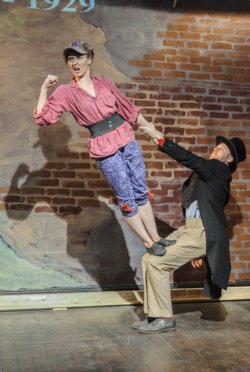|
"Injunction Granted"
Reviewed by Glenda Frank
 |
| Kendall Rileigh and
Cliff Miller. Photo by Ed Forti. |
"
Injunction Granted," written by the Editorial Board of the Living
Newspaper, Federal Theatre Project .
Directed by Alex Roe.
Metropolitan Playhouse, 220 E. 4 St., NYC.
May 29-June 28, 2015.
$25, $20 Students and Seniors, $10 Children under 18.
For
tickets: call 800-838-3006 , connect@MetropolitanPlayhouse.org, Metropolitan
Playhouse.org.
 |
Kendall Rileigh, Nathaniel
P. Claridad, Cliff Miller,
Lorinne Lampert, Perri Yaniv. Photo by Jacob J. Goldberg Photography |
There are many interesting ways to understand American
history: through the Black experience, the immigrant experience, or
the struggle of labor to earn a living wage. Capping years of protest,
Los Angeles just enacted a $15 minimum wage. The rest of the country
has yet to catch up. New York just rejected a statewide raise to $10.50.
"Injunction Granted" -- produced in 1937 as a Living Newspaper
under the auspices of the Federal Theatre Project, a New Deal program
to employ theatre talent -- was part of the labor struggle. And it
was probably instrumental in the termination of the project in 1939
by Congress.
Director Alex Roe (Artistic Director of Metropolitan Playhouse) has
been following labor-management confrontations with dismay, from the
firing of the flight traffic controllers under President Reagan to
Wisconsin governor Scott Walker’s recent success in union-busting.
The play is his way of entering the debate.
" Injunction Granted" explores the history of labor in America
from pre-Revolutionary days (indentured laborers) to the 1930s. That's
a wide range, and the play has about 200 different characters including
Eugene V. Debs and Samuel Gompers, presented in this production by
six nimble performers. We witness the eponymous injunctions granted
against any labor activity – union recruitment, protests, strikes,
even worker complaints – by individual judges without due process
or even a consideration of the arguments from both sides. So many
a periwigged adjudicator and many working-class representatives share
moments during different decades. Roe's problem was how to individuate
them and do it with a cast of six. His solutions were clever. He added
clown-like figures as he went for buffoonery, poignancy, outrage,
and the shock of history. He hired Kendall Rileigh for acrobatics.
Sometimes judges ruled hanging from a ladder or in various contortions.
Pink slips rained down. Light flashes (Christopher Weston) simulated
bomb explosions. A corporate head and judge played beach ball. Sometimes
the lighting was handheld to good effect. Acting was at one point
in slow motion while costume changes (Rachael Kosch) were always rapid.
The program itself includes a character code: top hats, industrialists;
bowlers, employers; straw pork pie, journalists; fedoras, supervisors;
caps, wage earners.
 |
| Cliff Miller and Lorinne Lampert. Photo by Jacob
J. Goldberg Photography |
But at times the production dragged, performers repeated
ideas, and the precise issues were a little confusing. The script
is high on historical incidents (some of them jolting), weak on dramaturgy.
Revivals of familiar plays (and musicals) have to rock the roof. Revivals
of obscure work have alternate paths. We can rediscover gems in even
a modest production, but when a script with a worthy theme has little
creative drive, we need over-the-top absurdity. Actors Nathaniel Claridad,
Scottie Davis, Lorinne Lampert, Cliff Miller, Kendall Rileigh and
Perri Yaniv brought high energy, innovation, a wide range of emotion,
and devotion to the project. “Injunction Granted” is worth
a visit.
|




